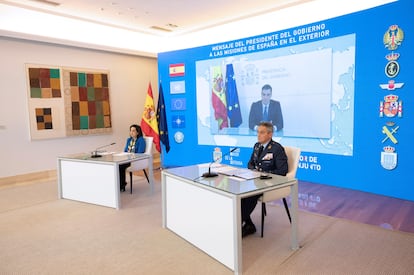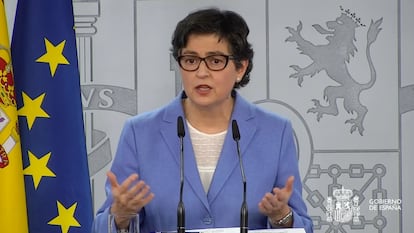Spain and UK in talks for post-Brexit military cooperation deal
The agreement will cover the fight against Jihadism, cyber-defense and joint missions; it will also contain “measures of trust” regarding Gibraltar

Spain and the United Kingdom are negotiating a security and defense agreement meant to serve as a key element of the new cooperation sought by both sides following the end of the Brexit transition period on January 1.
According to Spanish diplomatic sources, the deal will cover issues such as the fight against Jihadism, cyber-defense and joint military missions; it will also contain “measures of trust” regarding the base in Gibraltar, a British Overseas Territory located at the southern tip of the Iberian peninsula that is a source of continuous friction between both countries.
Together with France, the UK is Europe’s top military power. It is a nuclear power and a member of the United Nations Security Council. But the last-minute post-Brexit deal reached on December 24 does not include any chapters on foreign policy or defense, leaving the door wide open for bilateral cooperation.
The goal is to sign an ambitious agreement covering all aspects of defense cooperation
Now that the European forum has been ruled out (and Britain was never a very active member of the same), military cooperation between Madrid and London is limited to initiatives within NATO, which they are both members of. On the bilateral front, there are very few existing agreements: in 1985 there was an exchange of notes on cooperation and defense equipment, and in 2015 there was an agreement to exchange classified information.
But reality spills over those legal bounds: the British company BAE Systems is a key partner in the Eurofighter aircraft program, the biggest such initiative that Spain is a part of. And Rolls-Royce, for now at least, remains the owner of ITP, Spain’s main aero engine maker.
The goal is to sign an ambitious agreement covering all aspects of defense cooperation. But a deal of this nature cannot ignore the existence of the base in Gibraltar. The presence of this base has caused constant friction, including the time when the nuclear submarine Tireless spent a year at the port of Gibraltar, between May 2000 and May 2001, to undergo repairs for a crack; its presence triggered significant concern in the area and caused a lot of diplomatic strain.
Spain maintains restrictions against the British base in Gibraltar, where arriving ships may not dock in Spanish ports immediately before or after. And except for emergencies, military aircraft headed for Gibraltar may not use Spanish airspace. Through NATO, Spain receives information about British subs headed for Gibraltar, but there is no direct communication between the defense ministries of both countries.
The goal of the draft deal is to include “measures of trust” regarding the use of the Gibraltar base in order to “avoid the kind of friction seen regularly in the past,” according to Spanish diplomatic sources.
The move comes within a new climate of cooperation created by the recent deal of December 31 allowing Gibraltar to join the Schengen space and putting Spain, with support from Europe’s border control agency Frontex, in charge of checking transit at the territory’s seaport and airport.
Differing versions

The Gibraltar deal will be reflected in a UK-EU treaty that should be ready within six months. But Spain’s Foreign Minister Arancha González Laya and Gibraltar’s Chief Minister Fabian Picardo have offered seemingly contradictory versions about its contents in recent days.
On Saturday, González Laya told EL PAÍS that “responsibility over control [at the Gibraltar border] will be in Spanish hands, at the port and airport.” One day later, Picardo told this newspaper that “Spain will not be at the airport or the seaport.”
The truth is that both are right, but each one of them is stressing the part that is most favorable to their own interests. Travelers arriving in Gibraltar by sea or air will first face checks by Gibraltarian police, and then by Frontex agents, who will in turn be receiving instructions from the Spanish police, which is the only agency with access to the Schengen database. These Spanish police officers will not be physically present at the airport or seaport, but will be located inside a new building within Gibraltar. Without their “remote” approval, to use Picardo’s wording, nobody may enter Gibraltar and freely move across the borderless space comprising 26 countries.
The future treaty will not only include border control. Spain and the UK earlier signed four memorandums on Gibraltar that touched on the environment, tobacco products, police and customs cooperation and citizen rights. Except for the last one, these memorandums expired on December 31, but both sides are happy with the way they were applied and have decided to extend their duration for another six months while they get encoded into the new treaty currently at the draft stage.
The goal is to ensure that key issues are not lacking a legal framework, such as police and judicial cooperation in the fight against drug trafficking and money laundering. Longstanding differences over the price of tobacco products also appear on track to getting resolved. Spain’s foreign minister noted that the difference in pricing on both sides of the border has dropped significantly, which in turn has reduced smuggling, although tobacco products are still around 30% cheaper in Gibraltar.
Spain and the UK have also backed a fiscal treaty that foresees information exchange and new measures to ensure that residents of Spain do not set up their tax residence in Gibraltar for avoidance purposes.
“We’re going to create a relationship that will endure in a real and permanent way,” said Picardo, defining the future agreement as “a treaty of shared prosperity.”
English version by Susana Urra.
Tu suscripción se está usando en otro dispositivo
¿Quieres añadir otro usuario a tu suscripción?
Si continúas leyendo en este dispositivo, no se podrá leer en el otro.
FlechaTu suscripción se está usando en otro dispositivo y solo puedes acceder a EL PAÍS desde un dispositivo a la vez.
Si quieres compartir tu cuenta, cambia tu suscripción a la modalidad Premium, así podrás añadir otro usuario. Cada uno accederá con su propia cuenta de email, lo que os permitirá personalizar vuestra experiencia en EL PAÍS.
¿Tienes una suscripción de empresa? Accede aquí para contratar más cuentas.
En el caso de no saber quién está usando tu cuenta, te recomendamos cambiar tu contraseña aquí.
Si decides continuar compartiendo tu cuenta, este mensaje se mostrará en tu dispositivo y en el de la otra persona que está usando tu cuenta de forma indefinida, afectando a tu experiencia de lectura. Puedes consultar aquí los términos y condiciones de la suscripción digital.








































